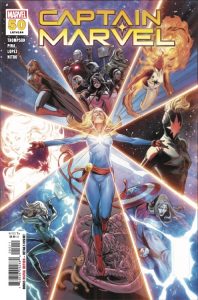
By Jim McDermott
By the time Kelly Sue DeConnick announced the end of her epic run on Captain Marvel back in June of 2015, she had established Carol Danvers as one of the most important and complex characters in the Marvel Universe, one that would become the basis for the film version of the character. The years that followed would see two shorter series that explored different aspects of Carol’s life. Writer Margaret Stohl would also establish an important new twist, that Carol was herself actually half-Kree.
Then in 2019, Kelly Thompson came on board the relaunch of the book. And over an extraordinary 50 issues, she has been able to not only build on DeConnick’s vision of Carol as a hero but expanded Carol’s life, giving her not only a Kree half-sister Lauri-Ell, but a sort of daughter in Binary, the child-like energy being who emerged from her in a time of crisis and would go on to save her life.
For as much as Captain Marvel was billed as a solo book, in Thompson’s hands it actually became a team book filled with women of the Marvel Universe. Even as the book leapt from the distant future and pocket dimensions to the far reaches out of outer space (and a massive and horrifying return of the Brood), more often than not Thompson used those situations to explore the relationships between women, the ways that in one another’s friendship they could draw strength and overcome the prisons of trauma.
In September, Thompson turns to a whole new group of fascinating women, taking on DC’s fabled Birds of Prey, with a cast that includes Black Canary, Cassandra Cain, Big Barda, WildC.A.T.S.’ Zealot and Harley Quinn.
I spoke to Thompson via email about Birds of Prey and her iconic run on Captain Marvel.
First of all, congratulations on Birds of Prey! It seems like such a perfect title for you. Is it a title you’ve been a fan of for a long time? Any favorite runs?
KELLY THOMPSON: Thank you! Yes! I’ve read – I’m pretty sure – every issue of Birds of Prey. That said, if I’m honest, the BOP fans are analyzing everything I say so much right now I’m afraid if I pinpoint favorite runs they’ll read too much into it! So I will just say that obviously the Gail Simone run really solidified the book for me as something truly special – I think it’s particularly fun in there when it’s Gail and Nicola Scott and when they’re crossing over with Secret Six, that’s probably some of my favorite stuff.
Your lineup is…INSANE. Really unexpected. Can you share a little bit about your feelings for each character?
THOMPSON: I literally just shot my shot. I just asked for every single favorite character I wanted (or needed) — and to my absolute shock DC just… said yes? I like to think they could feel the pure power and passion behind the pitch – like real true love – cause it’s there – baked into every word. [Laughs].
Okay. So I can’t get too specific on these for obvious reasons, but I’ll do my best. I wanted Dinah because I love her and because I had a great idea for a really emotionally resonant story with her at the center. And because it doesn’t really feel like a real BIRDS OF PREY book to me without at least Dinah or Babs.
Cassandra Cain is probably my favorite DC character of all time, so that was a no-brainer. Doesn’t hurt for this particular premise that she’s an absolute badass and one of the best fighters in the world. Barda has long been a favorite of mine. I think she’s highly underused which means there’s a lot you can do with her. Visually she’s incredibly fun, especially with an artist like Leo and I deeply enjoy her slight fish-out-of-water thing, I find it endlessly charming on her.
What can I say? I love my WildC.A.T.S. And Zealot is the best WildC.A.T. (no, I will not be hearing other opinions on that!) so of course I reached for her. I also loved that she was a true dark horse pick. There’s something specific about this plot that makes Zealot a good fit – and though I can’t say more, I think it will be fun for folks to discover her or re-discover her here.
Harley is divisive. I was worried about picking her for optics reasons only. I knew lots of people would love it and lots of people would hate it. I thought, from a practical standpoint, she would probably help the overall sales of our first arc, and she really worked for some plot reasons.
I know you can’t say much about storylines, but could you say at all what the book is about thematically, in a word or phrase or three paragraphs lol?
THOMPSON: My Birds of Prey is about what Birds of Prey is always about in my opinion – sisterhood. Women helping women and building relationships together, building something better. That said there will also be plenty of women punching other women in the face. What can I say? Sometimes the way we get to sisterhood is messy and complicated.
For the last couple years, I’ve been telling anyone who would listen that the Marvel superhero team books that everyone should be checking out is the stuff you’ve been doing on Black Widow and Captain Marvel. In both books you’ve taken a “solo” title and turned into not only a group book, but one filled with female characters and relationships.
THOMPSON: Ah, thank you so much. I think I took it personally years back when an editor said they thought I was better on solo books [laughs]. I love the dynamic between characters – I love bouncing them off one another and suggesting private jokes and lost/hidden stories in their collective pasts. I love it as a reader and as a writer, it just makes everything feel so rich and lived in. I do think, even on solo books, building out the supporting cast is critically important. It’s also just a smart way to bring in new readers and retain other readers. Spider-Woman was a regular recurring character in most of our run, and I think most Spider-Woman fans read every issue of our book because Jessica got some great development (and all the best jokes).
What was your take on Carol going into Captain Marvel? What did you think of as key to understanding her character?
THOMPSON: I think DeConnick distilled Carol Danvers better and more simply than anyone else – Higher, Further, Faster. She always wants to go up – that’s Carol. It’s quite simple, honestly. But it takes someone like DeConnick to find that in the writing and MAKE IT that simple, to distill it down. I’m incredibly grateful for what DeConnick did with Carol, it paved the way for so many of us to take the character in powerful positive directions.
The series has involved a lot of different kinds of female relationships, from Jess, who is Carol’s Person; to Jen Takeda, who sees Carol as a mentor; Ripley or Amora, who are enemies of sorts, but also, It’s complicated; Rogue, who is a whole different kind of complicated; to Carol’s new sibling Lauri-Ell and her sort-of-daughter Binary. Plus we get moments with Scarlet Witch, Phyla, Monica, Echo, Future Emma Frost and Kamala, which are each different in and of themselves. What was it like writing that? It’s so different than what most superhero team books seem like they allow a writer to do.
THOMPSON: Yeah, I mean, I think I was very lucky that the success of Captain Marvel allowed us to do things a little differently and for me to lean into the things I was more interested in (and believed the readers would be interested in) but that were maybe a bit atypical for a successful superhero book?
I didn’t want to destroy the world every six issues and so I tried to come up with some less conventional plots – like Carol going to the future, Carol doing a body swap with Dr. Strange, or trying to learn magic in order to eliminate one of her weaknesses, and then being sent to a magical prison for “magic crimes,” and sorta having an existential crisis.
But part of that is just pulling in interesting characters and letting them bounce of one another a bit and in the case of Captain Marvel I certainly leaned more toward women – I just…I just like women! And a lot of great ones are super underutilized which works out nicely for me.
Would you say getting to build out this whole universe of female characters gave you any ideas or insights as a writer that you want to bring into Birds of Prey or other books going forward?
THOMPSON: Absolutely. I mean, I think I’ve been trying to write my own version of a Birds of Prey type book ever since my A-Force run ended — I surrounded Carol with women heroes, I had Black Widow build her own team in San Francisco, mostly women. I think the same way a lot of writers are obsessed with father-son relationships, I’m obsessed with sisterhood. So even when a book isn’t necessarily ABOUT that thing, I think writers still find themselves leaning into the ideas they obsess over, the things that fascinate them. It isn’t necessarily a plan, it’s more organic than that.
And I want to be clear, part of my obsession with Sisterhood is that historically in real life I don’t think I’ve been great at it. I think the world has long been structured in such a way that it absolutely pits women against each other in the most brutal and disgusting ways, and I fall prey to that, just like anyone else. But it’s something that I’ve recognized as truly toxic and actively work to extricate myself from – and one of the many ways – perhaps the best way in my case as a writer – is through these stories. Presenting a better way, a more inspirational and aspirational alternative. Something for me to work toward, something for all of us to work toward.
What made you want to make Jen Takeda an ongoing character in the story? She’s not someone with any obvious connection to Carol.
THOMPSON: I just hate when really great characters like Jen get lost in the shuffle of cancellations and new book launches. It’s not anyone’s fault, it’s just a thing that happens and it’s a bummer. I knew in Carol’s stories we’d be talking a lot about power – people having power, growing in power, harnessing power, and also it being stolen – and like any character with ‘power that is also curse’ – Jen’s got excellent parallels to that in a lot of ways. She has rich baggage, just like Carol. And I hope someone is able to pick her up and carry her forward from here.
Laura and Binary have added so much, too, and did so pretty much immediately. Were they always part of the concept for the book? What made you want to add them to Carol’s life? And why do you think they’ve both landed with readers as well as they have?
THOMPSON: We talked about me adding a relative – a half-sister – pretty early. It seemed like a waste to not build on the great stuff Stohl had done with Carol’s mother and Carol’s origin in Life of Captain Marvel. And a half-sister seemed like both the obvious choice and the best choice, which often aren’t the same but here seemed like they were. I’m also a big fan of giant women fighters, even better if they’re also sort of strangers in a strange land (Barda!). I find that concept pretty charming. I suppose it’s a little tired and it can play out, but I have to say when done well, I always enjoy it. There are so many quirky little permeations within it that are so fun.
Binary was different. Binary came from us wanting to push on Carol’s powers and limitations and also the plain reality that Binary is a name (and character design!), tied to Carol, but just sitting there unused because she IS Captain Marvel now and it’s unlikely to change anytime soon. So I thought we should actually try to use it to make something cool and (ultimately) devastating. Success! (cries briefly in middle of answering questions).
So many of the villains in the series are toxic men—Nuclear Man (literally); Vox Supreme; Ove.
THOMPSON: [Laughs]. Yeah, I suppose that isn’t a coincidence. Nuclear Man of course is an old character that we just gave a re-design to – I updated his speech to a more modern version of course, but we honestly toned him down if anything!
I found Vox Supreme particularly horrifying. The sense of violation is so profound. He’s literally trapping women within themselves. When Binary first appears, she’s almost like the spirit of Carol refusing to be bound.
THOMPSON: Yes! Yes! Sorry. Man, you write this stuff and you hope people get it, but often don’t really know, because for the most part, those kind of things aren’t the things people talk about in monthly superhero comics. I was interviewed last year by an author writing a book that includes a chapter about Deadpool being King of The Monsters. And when I read his completed chapter I was just WEEPING. Because that guy got it. He got everything I was trying to do. And you don’t have to get it like he does to enjoy the story – it’s full of jokes and violence and kissing and Jeff – it’s full of all sorts of legit enjoyable stuff, but man is it extra satisfying when you come upon someone who totally connected to the themes and understood what you were trying to say with your “little superhero comic book story” – so thank you! Yes! Binary refuses to be bound. Her first words being a shouted NO are certainly no coincidence. Nor is how she dies – unwilling to be bound.
How did you think about what you wanted in your big bads? Which one did you find the most despicable?
THOMPSON: I think Vox Supreme is the scariest and probably also the most despicable. Encasing someone in a (let’s be real, claustrophobic nightmare suit) that controls you? That guy is not messing around. It’s also arguably Carol’s biggest loss in my run – she saves the day of course, but one of the Kree Refugee Camps gets blown up in the first issue of the arc before she even realizes that she’s IN something. That’s the flaw of that arc in my opinion – wraps up too clean without any reflection back to what was lost. Panel time is always precious. You never have as much as you think you have. Sigh!
In the terrain of silly villains: Where did the idea for the Snat come from? They are hilarious, and also seem super specific to Carol: hot men riding cats who smell gross and are ridiculous.
THOMPSON: Edibles maybe? I mean, that’s a joke, but it’s not totally out of left field. The pandemic was very stressful, what can I say? But more seriously, I just like villains like that. Weird and strange and fun and less serious – I feel like you need SOME of that mixed into all the dire world-ending stuff, right? Then again, Technet (somewhat obscure super weird Excalibur villains!) is one of my favorite villain teams, so I’ve clearly got odd tastes and can’t be trusted.
Speaking of cats who are not cats: Did you always hope to do a Chewie episode? It’s SO good. I feel like they need to collect it, “It’s Jeff!” and Fraction/Aja’s Pizza Dog story in a trade.
THOMPSON: I was super glad we got to do a Chewie issue, but we were sorta forced into it by the Judgment Day event. You know, we’d JUST come out of a four-issue arc where Carol is trapped in a “magical prison” and literally being judged by a magic tribunal – so her arriving back in New York only to be judged again for a tie-in to this event was NOT gonna work. But we had already committed and so I had to find a way around it. Chewie was the perfect solution. And a great reminder that sometimes the best stuff comes out of slightly desperate circumstances.
For you to (nearly) end on the Brood—and to spend so much time there—was a real callback, and underlines another major theme of the book, which is how people deal with trauma. You’ve got Ripley becoming a villain because she doesn’t want to get hurt again. Hazmat slowly opening up and revealing how much she’s been through. Rogue dealing with what she’s done to Carol, and Carol, who has not only the past traumas of Rogue and the Brood, but everything around Ove.
THOMPSON: DeConnick has a terrific quote that I think sums up Carol exceptionally – which is something along the lines of – Captain America gets back up because it’s the right thing to do, Carol Danvers gets back up because ‘fuck you’ – and I think about that a lot. I think about why it feels so true and why it would be true. Carol and Steve have a lot in common, but ultimately very different journeys and some of Carol’s journey has been…extremely messed up, even by comic book standards. And so OF COURSE this is how she turned out. Her will is just…I dunno if it’s “unmatched” but she’s up there. I think Carol wills A LOT into existence.
And so it made sense to me to go back to the origin of her modern powerset she got from the Brood torturing her. It made sense to me to dig into that and show a little bit of what might have happened to her back then – and to put her through a different version of it today and see how and if it would or could change her again. There’s a lot I love from that arc, but what Sergio did when we’re inside Carol’s mind is some of my favorite stuff and something I’d been wanting to do with her for a while.
What was it that made you want to make that such an important part of the overall story?
THOMPSON: I think things (people/creatures/the world) trying to take power from Carol or to control her is literally the theme of her life. And taking power from women is a tale as old as time. It’s relatable and yet for Carol, through a superhero lens, it’s epic in scope.
Friendship seems to be such a key element in the way you view trauma, too. There are all these little moments throughout the run where different female characters help each move forward: Rogue helping Hazmat feel seen; Kwannon learning about her future daughter Sora, which is such a gift for that character.
THOMPSON: I think Carol, and this is one of the ways in which we are similar, likes to do things herself. She’s a good tactician and leader on a field of battle but she’s definitely a “I’ll just do it myself so I know it’s right” kind of a person and that doesn’t always lead to being the most open, and it’s one of Carol’s greatest flaws. We certainly saw her doubling down on it in that last arc – and headed for disaster – but the resolution there and the wrap-up in issue 50 – is I think a hopeful look at Carol changing – at her letting more people in – of her accepting that she can’t do EVERYTHING herself.
Or there’s that moment where Laura goes to touch Rogue to help heal her, which is a pretty standard event. But the way Laura holds Rogue is so loving. We never see those characters interacting in that way.
THOMPSON: Thank you. It’s one of my favorite little beats from that arc. I actually originally wrote it with Laura kissing Rogue in that scene – not romantic or anything, but just because there are so many examples of Logan doing that with Rogue over the years with her power – including the first time he gives his power to her. And so it just made sense to me that Laura would do the same.
But there were concerns about that and while at first I was frustrated, I do think, with the benefit of hindsight, it would have inadvertently made the scene about something else — when really it was just about friendship. About loving the people in your life, being glad they’re not dead, and being glad that you have the power to do something about that.
Part of me wants to say the book is about how friendship can heal old trauma, but I’m not sure that’s exactly right. It’s not like these relationships erase what has happened, is it? I keep thinking of Rogue’s offer at the end: “Can I share the burden with you?”
THOMPSON: I think it’s not so much how friendship can heal trauma – but maybe more – allowing your friends to help you let go of old trauma can open up your whole world? White-knuckling it through life CAN get you through, but I doubt you’re having a great time. And we only get one shot at this, so we should probably try to have a great time if we can?
How do you think about the role of friendship in dealing with trauma?
THOMPSON: I think the hardest thing is to deal with trauma alone. I don’t care how strong you are — emotionally, physically, mentally, whatever you got — we all need someone at some point. And while that feels scary and horrible to a lot of people (me!) it’s also incredibly beautiful and important. People are not supposed to be our own little islands. We’re supposed to make connections and build communities.
The stories at the beginning and the end of the run with Rogue are incredible. First you ask Carol to relive one of her worst experiences, and then to let Rogue share her pain (which somehow seems even harder).
THOMPSON: Thank you. Yeah, I tend to agree that the latter was actually harder for Carol and if she and Rogue hadn’t gone through everything they went through in arc 1, I don’t know that Carol could have managed to share that pain (and power) in the last arc – and it would have had dire consequences for her and everyone around her. I don’t think that’s mind-blowing storytelling or anything, but I do think it is good storytelling, and unfortunately, a kind of storytelling we see a lot less of these days because creators rarely have long runs where they can build B and C plots out into something great over time. It’s a shame.
What made you want to begin and end with Rogue like that?
THOMPSON: Well, I never dreamed we’d get 50 issues, so I never even imagined it until we were right at the finish line! In fact, the whole reason I reached for Rogue in the first arc was because I had no idea how long I’d get to write the book and I KNEW I wanted a chance for those scenes between them – scenes that I’d been aching for as a fan. But when I found out we were getting to use both The Brood and some X-Men for our last arc I began to make plans for how I could tie that all together – first arc with last. Sometimes a thing does actually come together and boy is that nice.
I know I should have things to say about Rhodey; he and Carol get a lot of time in this book. But honestly, I still feel like Carol’s Ride or Die is Jess.
THOMPSON: Listen, I love Rhodey and I think he and Carol are a good match. Nobody told me I had to keep them together, I did it because they make sense in a lot of ways and because I didn’t think the focus in Captain Marvel’s superhero book should be “looking for love” (especially when she’s being billed as one of the most powerful and popular female characters in the Marvel Universe), and so keeping her in reliable low-drama relationship was a good fit for our goals most of the time. But I think it’s impossible to deny the chemistry of Carol and Jess. I couldn’t deny it as a reader or as a creator, nor would I want to. It just is. And it’s beautiful.
How do you think about Jess and Carol as a pair? Are they Thelma & Louise? Romy & Michele? Christina and Meredith? For you, what makes them such amazing friends?
THOMPSON: I think Carol and Jess definitely have Thelma and Louise energy and certainly that righteous vengeance vibe, but Thelma and Louise are desperate – without power or assets or connections – so even the fight for their lives, while righteous and inspirational – is doomed to failure. So I like to think of Carol and Jess as a more modern Thelma and Louise — who have already accrued a lot of power and connections — and are thus no longer just fighting for their own lives, but for everyone else’s.
As issue 50 comes out, Carol has clearly learned a ton—about her powers, what it means to be a hero, and now loss. What would you say this story is been about for her?
THOMPSON: Yeah, I think it’s mostly been self-discovery – learning and accepting her weaknesses – while trying to push herself forward into exceptionalism – to push forward into “what’s next.”
And what has it been about for you?
THOMPSON: Probably a bit the same. Much less interesting of course. But you can’t put your character through those things for nearly five years and not have to confront them yourself. Like Carol, like most of us, I am forever a work in progress.
Congratulations again on the amazing run. I can’t wait to see how it all ties up, and to read Birds of Prey!
THOMPSON: Thank you!
Did you read Captain Marvel #50? Are you looking forward to Birds of Prey? Let The Beat know what you’re thinking, here in the comment section or over on social media @comicsbeat.


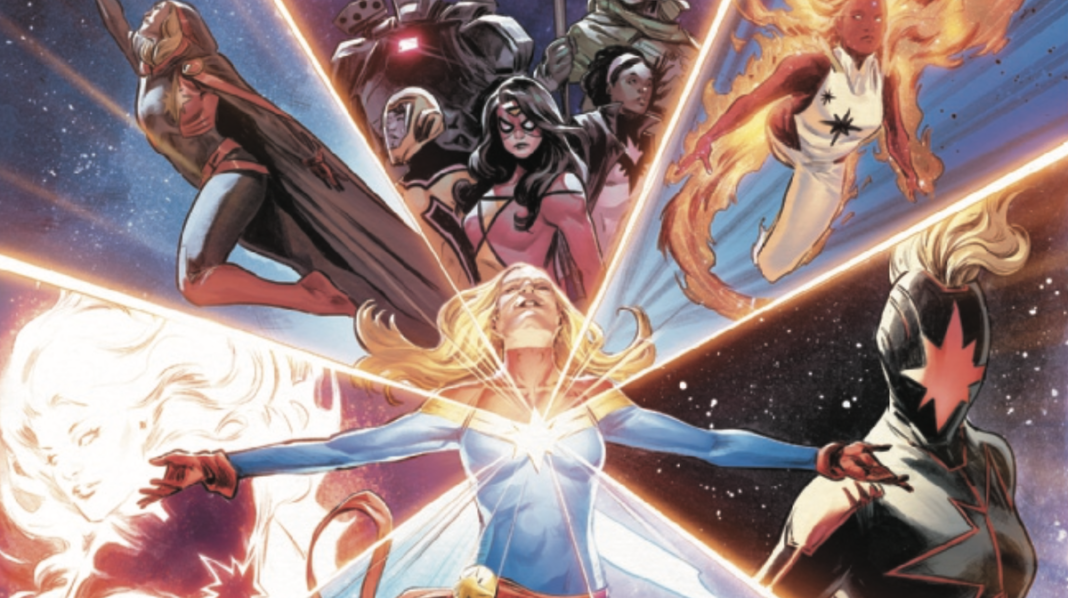
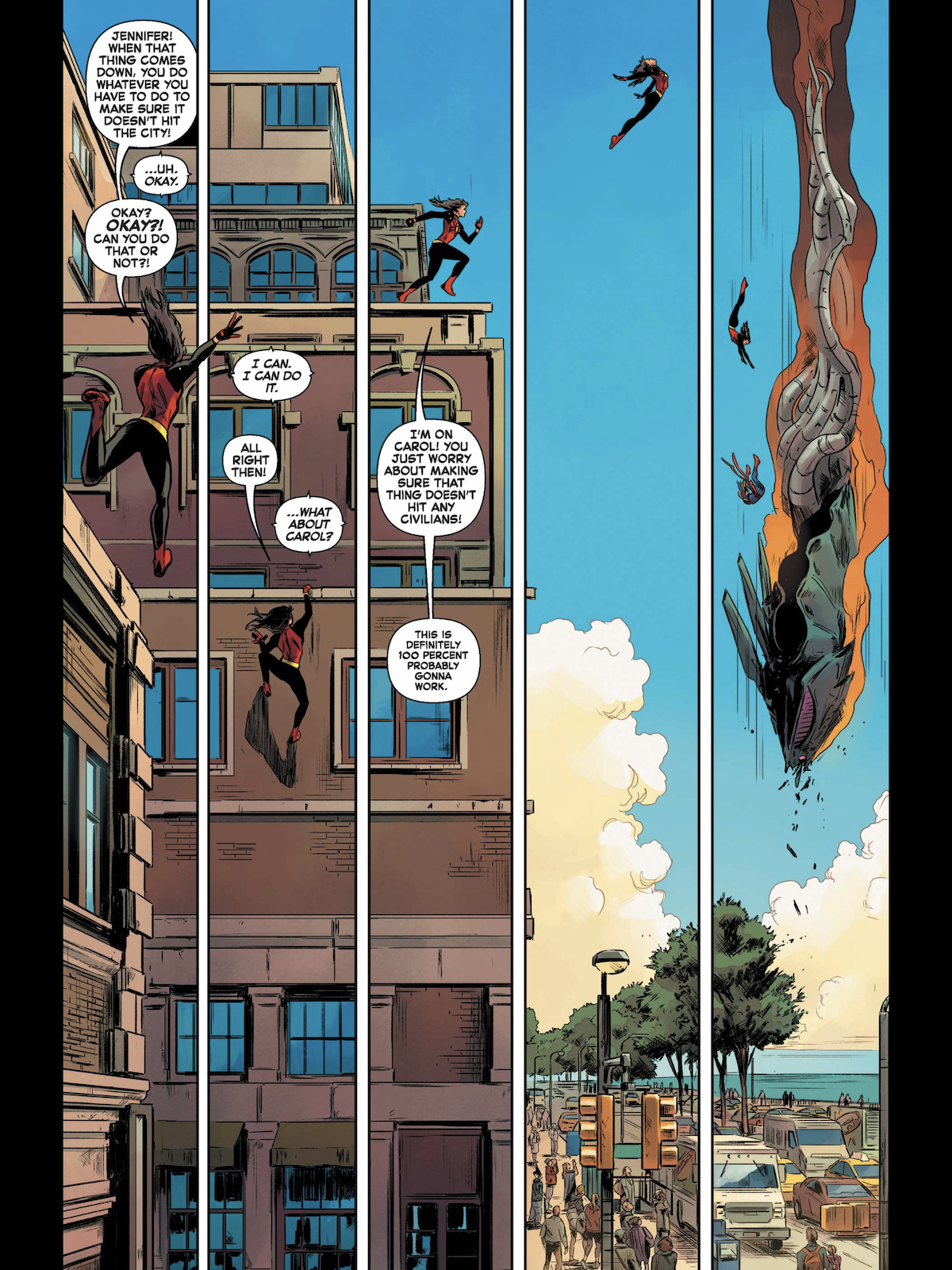
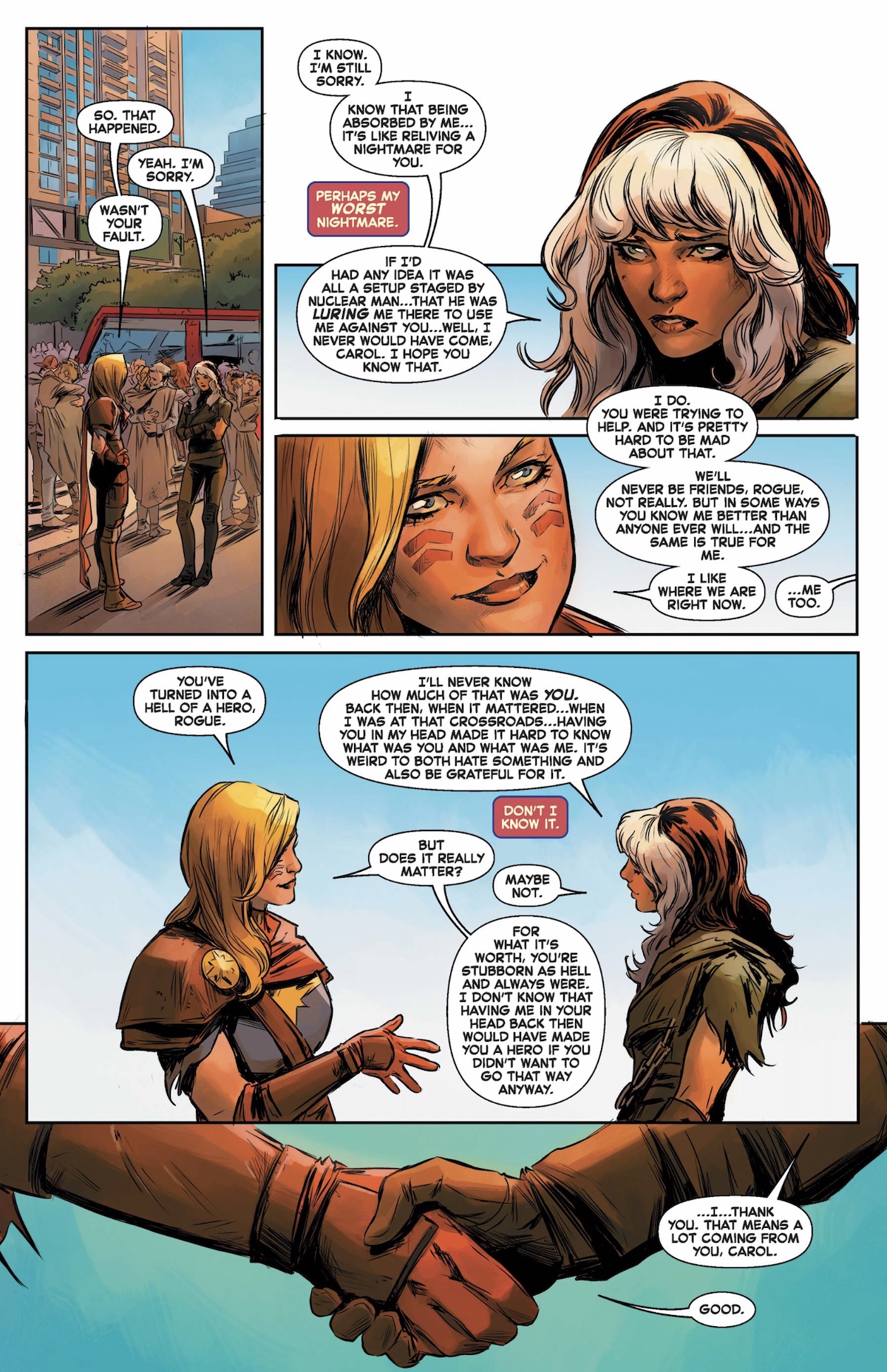
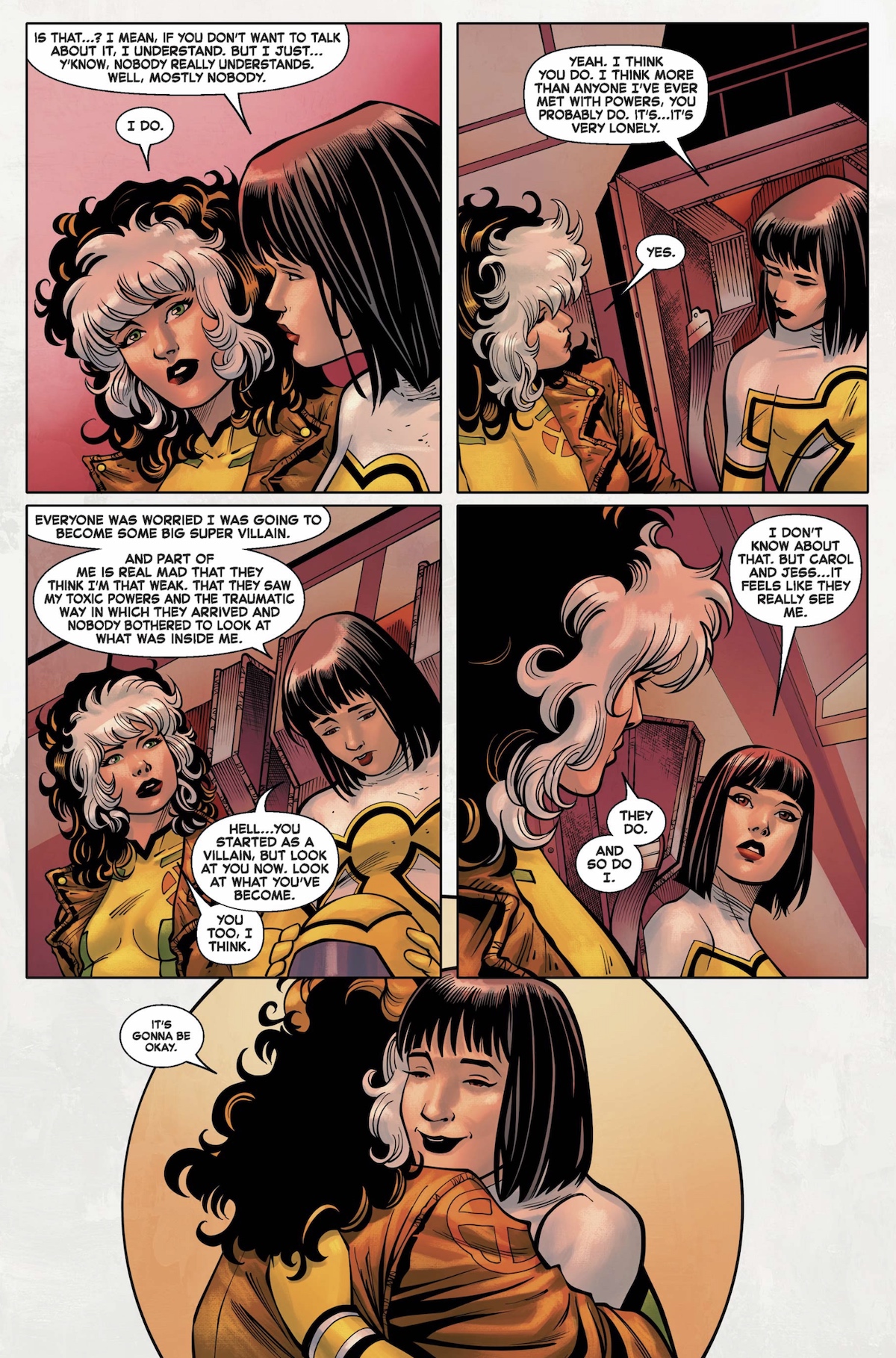
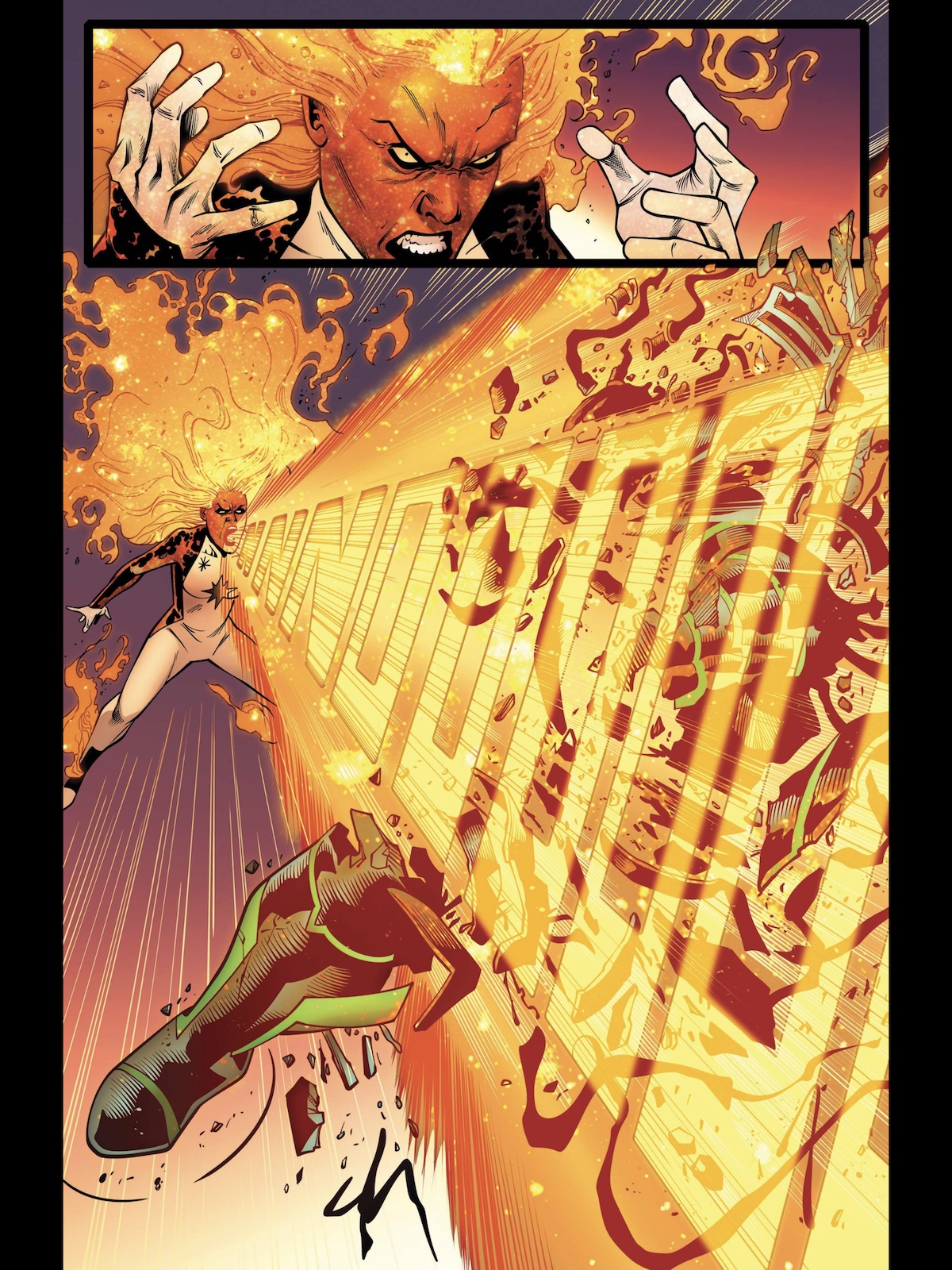
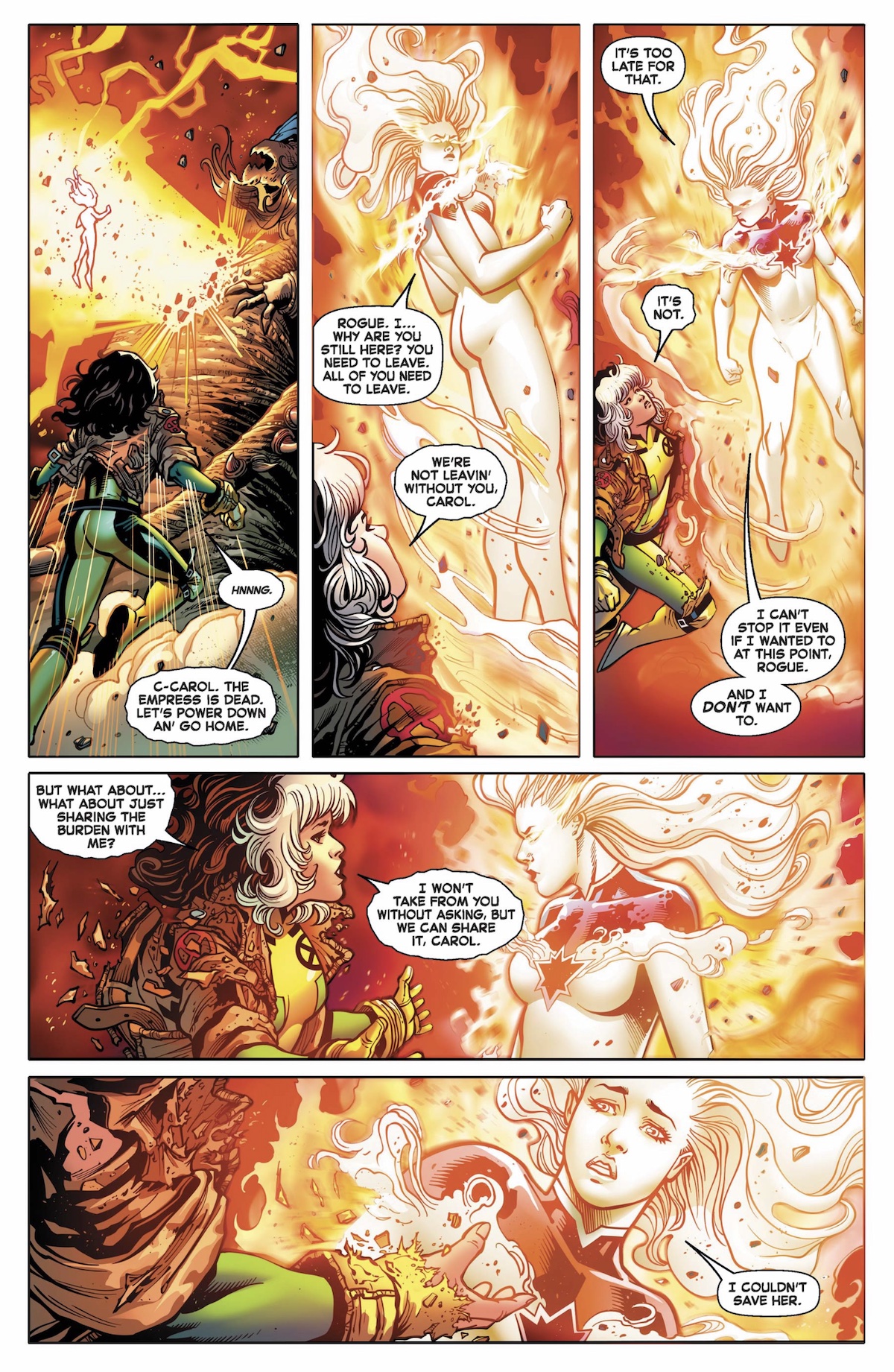
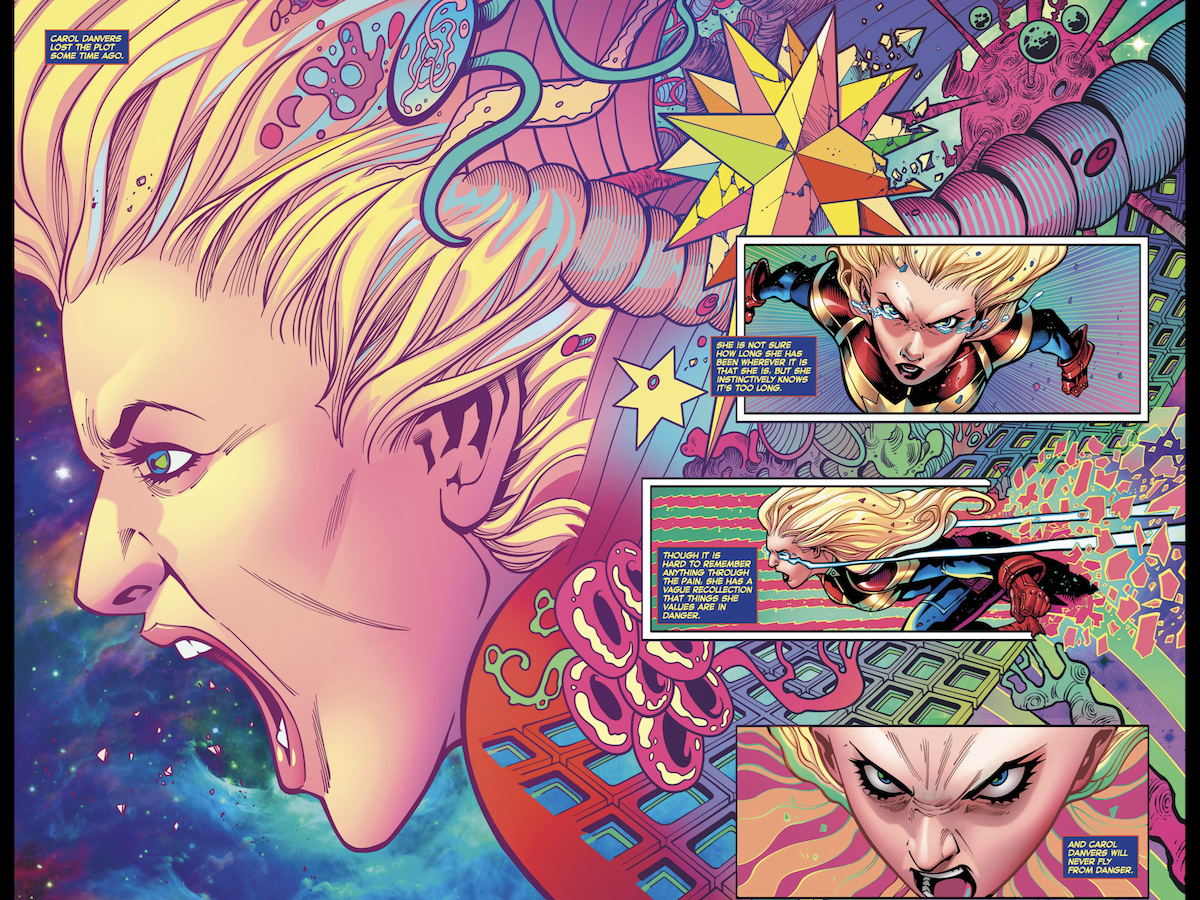
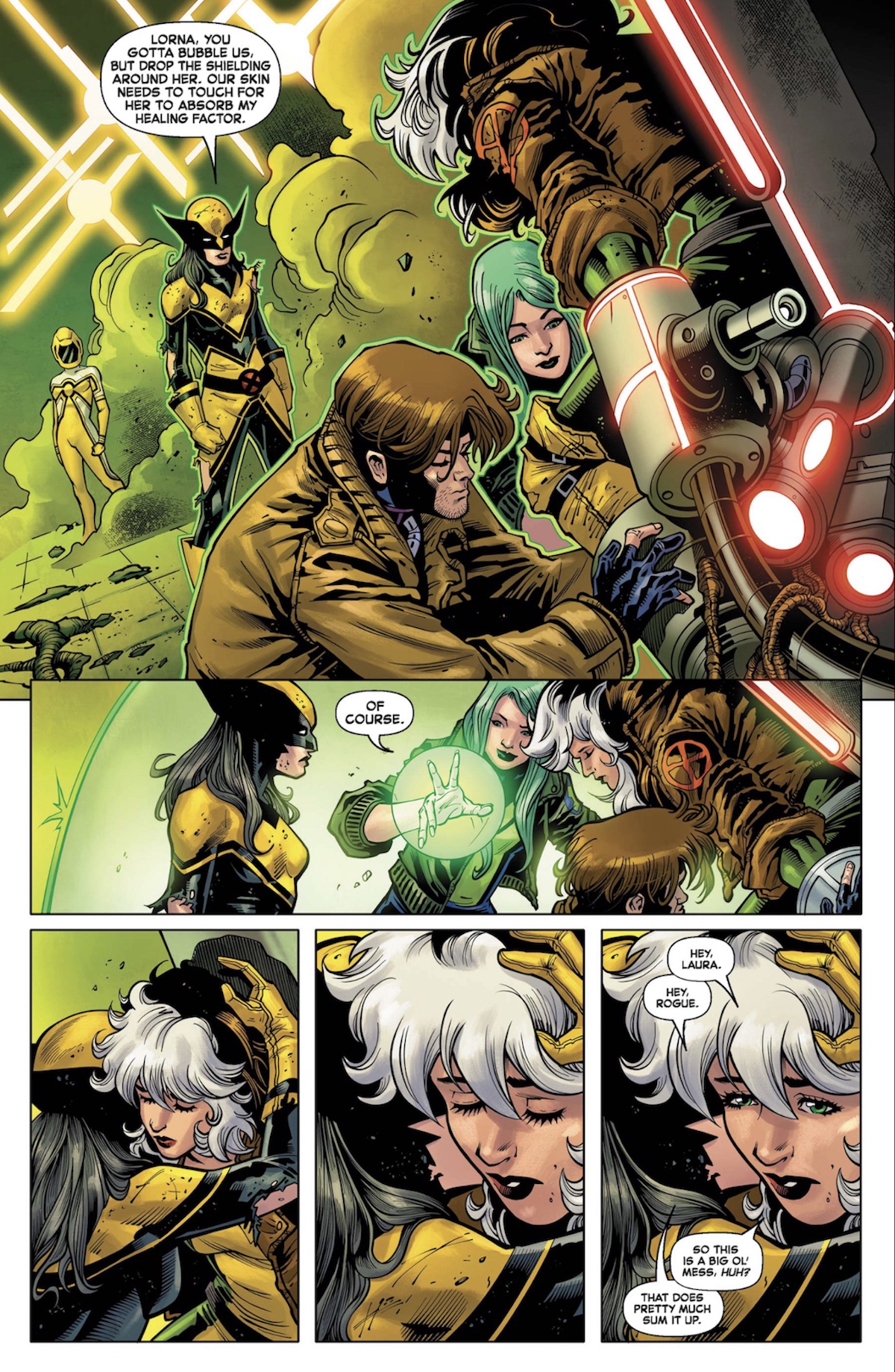
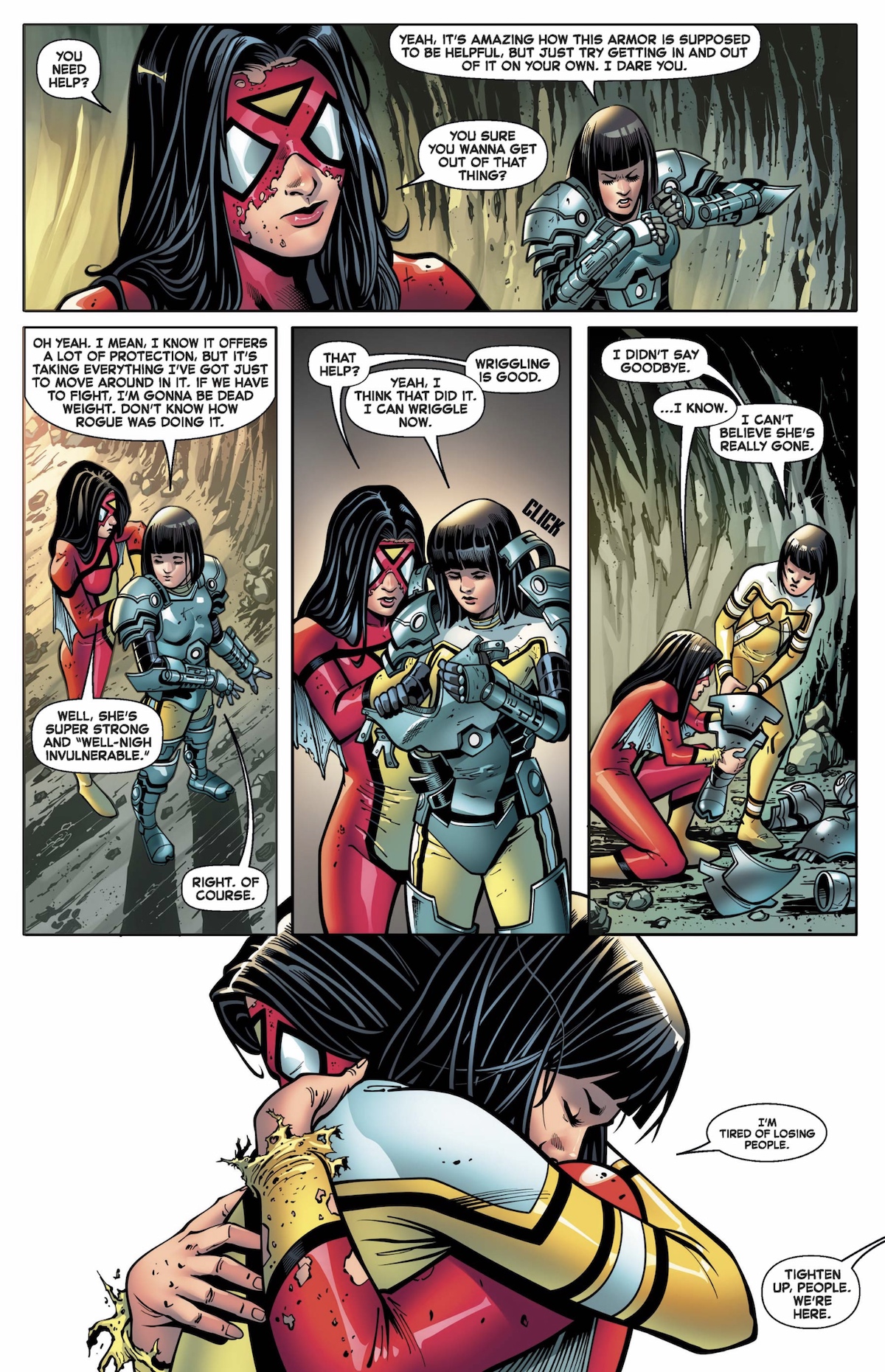
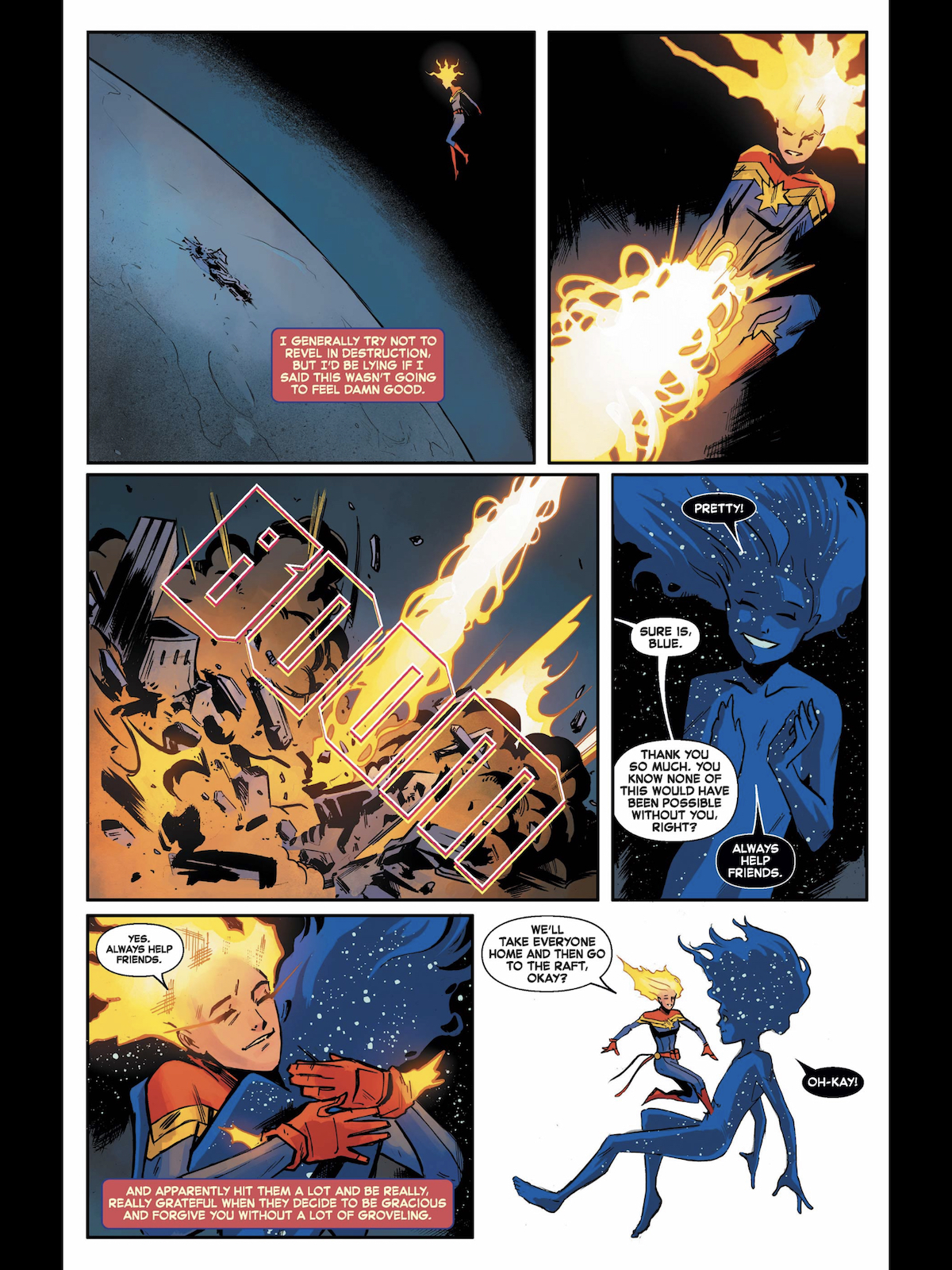
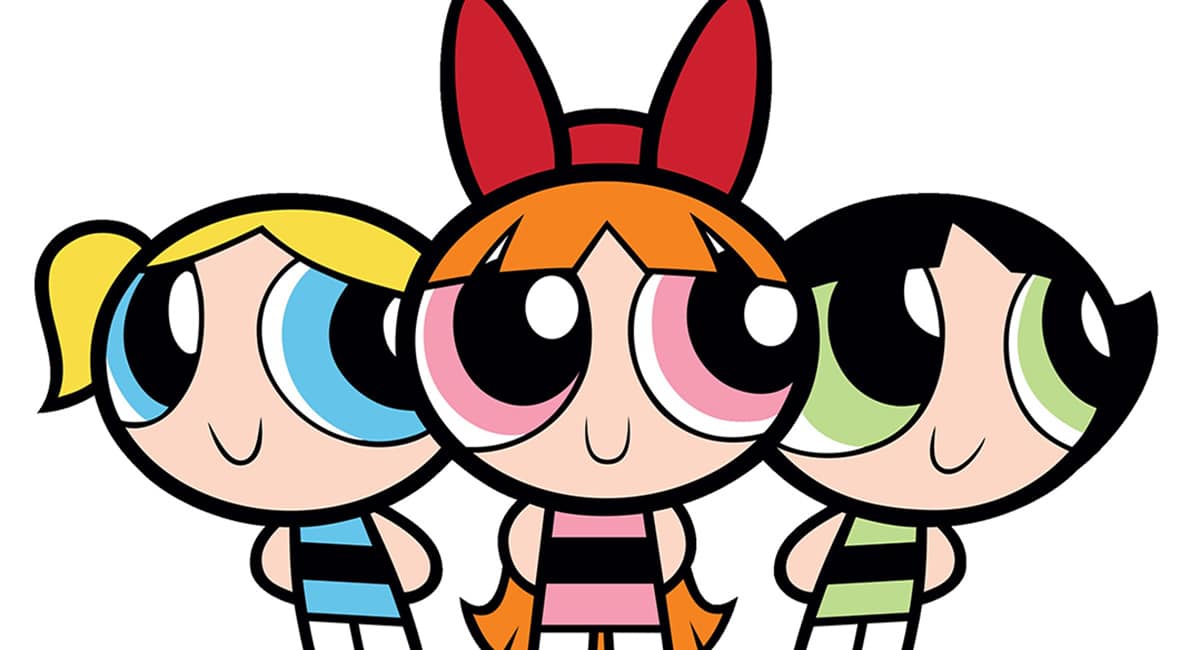
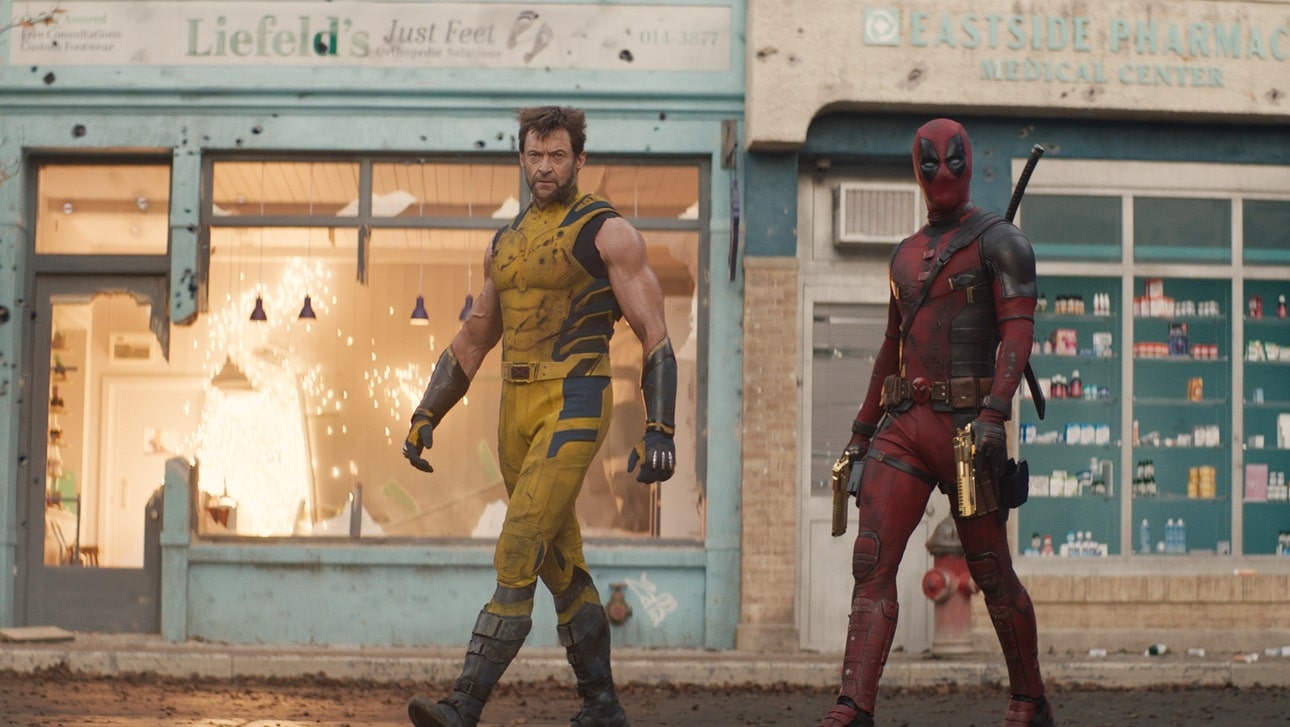
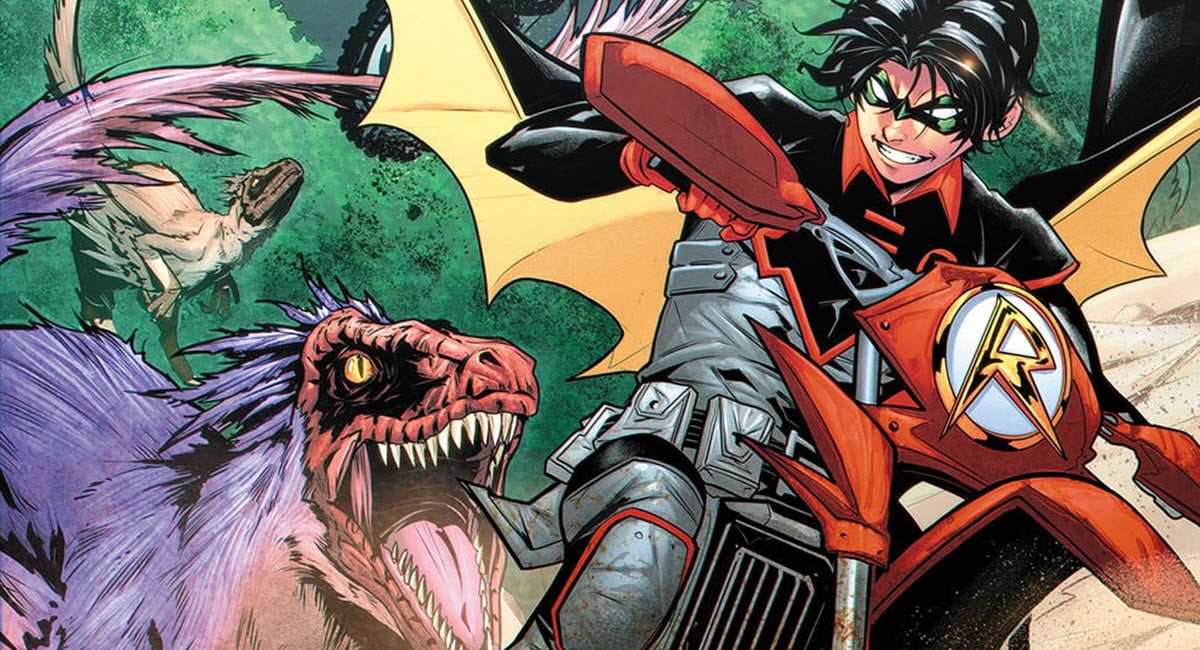



Great interview — thanks!
Comments are closed.